Lord in the Shadows
In the waning years of the 18th century, as the fires ofrebellion blazed across the Atlantic, William Eden, 1st Baron Auckland, stoodat the apex of Britain’s clandestine war. From his unassuming office in London,hidden behind the façade of bureaucratic mundanity, Eden orchestrated a web ofespionage that stretched from the drawing rooms of Westminster to the muddybattlefields of the American colonies. He was not a man of the sword, but ofthe quill and the whisper, a master of secrets whose name was known only to aselect few, yet whose influence shaped the course of empires.
Privileged YouthBorn in 1744, the son of a Durham baronet, William Eden’searly life was one of privilege and education. He became a legal scholar atEton and Christ Church, Oxford. In 1771, he published Principles of Penal Lawand became a recognized authority on commercial and economic questions. Yet hiskeen mind for strategy drew him into the shadowy world of intelligence. By thetime the American colonies began their murmurs of discontent, Eden had alreadyproven his worth in diplomatic circles, but it was his appointment as the headof the British Secret Service in 1776 that would define his legacy.
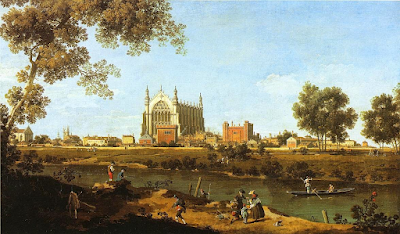 Eton CollegeSpy Master
Eton CollegeSpy MasterThe American War for Independence was not just a war of battlesand maneuvers but also an intelligence war. Eden understood this better thanmost. While Secretary of State for the Colonies Lord George Germain plotted grand strategy and generals like Sir WilliamHowe and Lord Charles Cornwallis planned campaigns, Eden waged a silent war,fought with coded letters, double agents, and quiet betrayals. His office,tucked away in a nondescript building near St. James’s, was a nerve center ofespionage. Maps of the colonies, intercepted dispatches, and lists of suspectedrebel sympathizers and agents lay stacked on his desk. Each provided a clue inthe vast canvas of rebellion he sought to undo. To accomplish this, theintelligence budget soared to some £200,000 during this period! That’s about £40,706,380in 2025 money, adjusted for inflation.
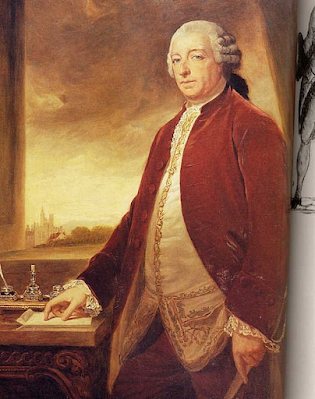 George GermainReading “Traffic”
George GermainReading “Traffic”Eden began his mornings reviewing reports from his networkof spies, many of whom operated under the cover of merchants, clergymen, oreven Loyalist sympathizers in the colonies. Spies embedded deep within theContinental Army could feed details of troop movements and supply shortagesthat would make their way to London. Spies in the rebel capital worked in thesocial circles of Philadelphia and developed political information throughelicitation and observation. Eden read dispatches with a meticulous eye, hisquill scratching notes in the margins, decoding the hidden meanings behindtheir carefully chosen words.
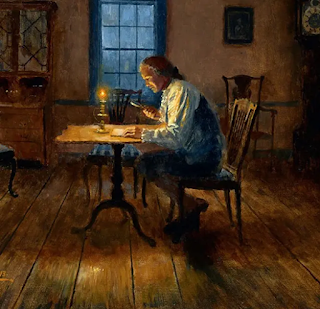 Reading Traffic
Reading TrafficThe Cocktail Party Circuit
Eden’s evenings were spent in the company of the powerful,attending dinners and balls where the fate of the empire was often decided overport and cigars. He was a master of subtlety, his conversations laced withdouble meanings, his questions probing yet innocuous. At one such gathering,hosted by Lord North, Eden overheard a whispered conversation between twoFrench diplomats, hinting at their plans to escalate support for the rebels.The next day, a coded message was dispatched to a British agent in Paris,tasked with uncovering the details of the French plot.
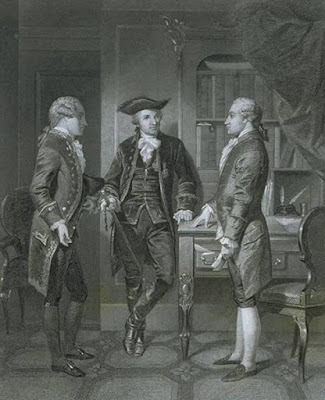 Diplomats Sharing ConfidencesPolitico & Envoy
Diplomats Sharing ConfidencesPolitico & EnvoyIn 1778, Eden, as a Member of Parliament, introduced an Actto improve the treatment of prisoners of war, which caused some controversy asAmerican captives were often regarded as traitors, not war prisoners. He also organized, arranged, and accompaniedthe Earl of Carlisle as a commissioner to North America in a failed attempt toend the American War of Independence through negotiation. On his return in 1779,he published his widely read Four Letters to the Earl of Carlisle. This work discussed the ongoing war with theAmerican colonies, France, and Spain, advocating for continued military effortsto crush colonial resistance. Eden also examines public debts, credit, andsupply-raising methods, alongside Ireland’s push for free trade, reflecting oneconomic and imperial policies.
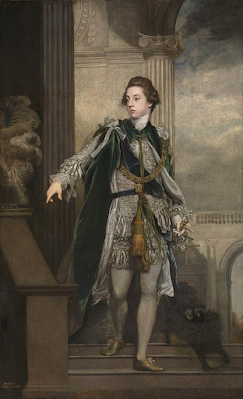 The Earl of CarlisleA Spy’s Home Life
The Earl of CarlisleA Spy’s Home LifeYet, for all his successes, Eden was not immune to theweight of his responsibilities. The war was a personal and political struggle,and the constant stream of betrayals, failures, and losses took their toll. Hewed Eleanor Elliot, of the influential Elliot family. She and their six sons and eight daughtersprovided some solace, but even in the quiet moments at home, his mind was neverfar from the war. Eden would sit by the fire, a glass of Madeira in hand, hiseyes fixed on the flames as he pondered the next move in the deadly game ofchess he played with the rebels.
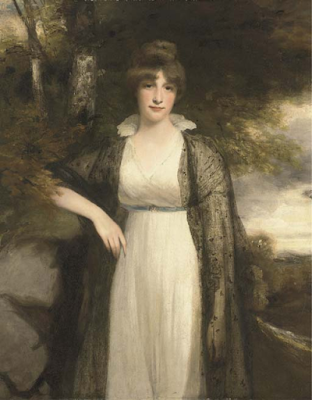 Eden's First Daughter, Eleanor AgnesThe Great Game
Eden's First Daughter, Eleanor AgnesThe Great GameBut Eden’s most significant challenge was collectingintelligence in the one place the war would be won or lost—Paris. The British orchestratedintelligence operations against the American commissioners, the Frenchgovernment, and the Spanish and Dutch representatives. While British diplomatsand agents were also active in all the major European capitals, Paris was thepolitical center of gravity in the game being played out. Spies were recruited and“run” against all parties, with the American Commission in Passy and BenjaminFranklin himself a target. His agents spread disinformation to undermine Frenchconfidence in the American cause or delay their military commitments, thoughwith limited success given France’s strategic commitment.
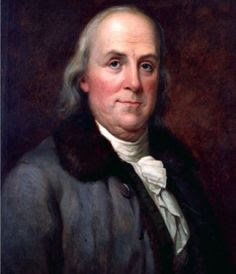 Benjamin Franklin
Benjamin FranklinEden tracked negotiations between French Foreign MinisterCharles Gravier, Comte de Vergennes, and American representatives like BenjaminFranklin. The goal was to influence the French and Spanish from officiallyjoining the Americans in war with Britain. But in 1778, France threw her hatinto the ring and signed a formal treaty of Amity and Alliance with the UnitedStates. Britain did manage to slow Spain’s entry into the conflict, buteventually that too would fail.
Spies Among UsOne of the darkest moments of Eden’s tenure came in 1781, asthe war neared its climax. The British surrender at Yorktown was a blow to the army and Eden’s carefully constructed network. Many of hisagents were exposed or captured, their identities betrayed by a mole within theSecret Service itself. Eden’s investigation into the breach was ruthless; hisinterrogations were conducted in the cold, stone-walled chambers beneath hisoffice. The traitor, a junior clerk with gambling debts and a taste for Frenchgold, was quietly dealt with, his fate sealed in a manner that left no trace.
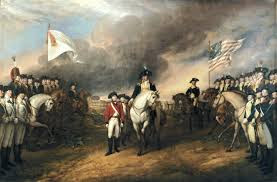 Surrender at YorktownManaging Defeat
Surrender at YorktownManaging DefeatOnce defeat was inevitable, the British went to workmanaging it. Eden’s role shifted from espionage to diplomacy. In 1783, he wasappointed as one of the negotiators of the Treaty of Paris, tasked withsalvaging what he could from the wreckage of Britain’s colonial ambitions. Heapproached the negotiations with the same cold pragmatism that had defined hisintelligence work, securing favorable terms for Britain despite losing thecolonies. For Eden, it was not a defeat but a strategic retreat, a chance topreserve the empire’s strength for future battles along the lines outlined in his Letters to the Earl of Carlisle.
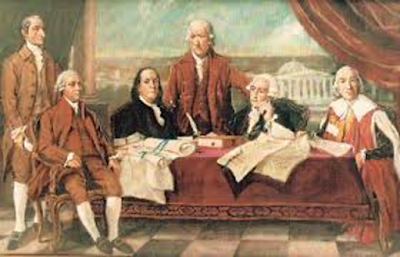 Treaty of Paris NegotiationsSpy Turned Statesman
Treaty of Paris NegotiationsSpy Turned StatesmanIn the following years, Eden continued his excellentservice as a member of Parliament, a diplomat, and Governor-General of Ireland.In 1789, William Eden was raised to the Peerage of Ireland as Baron Auckland. In1793, he retired from public service but was further honored when he was raisedto the Peerage of Great Britain as Baron Auckland, of West Auckland in theCounty of Durham. But his time as the head of the Secret Service remained hisdefining chapter—and few knew of it. Eden was the silent architect of Britain’scovert resistance, the man who had fought not with a sword but with secrets,wielding information like a blade in the dark.
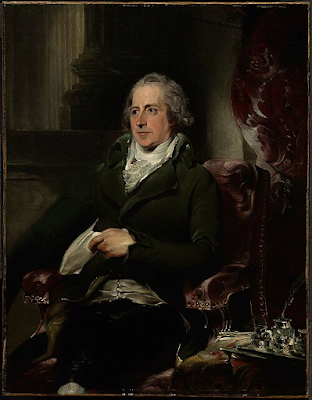 William Eden, 1st Baron Auckland
William Eden, 1st Baron AucklandWilliam Eden died on 28 May 1814 at 69 in Beckenham, Kent. The 1st Baron Auckland remains the shadow warlord whohad guarded Britain through its darkest hour. Despite his public honors, thereal hallmark of his life was duty and sacrifice as the silent watcher who hadstood between order and chaos, waging unseen battles that shaped the course ofhistory.



